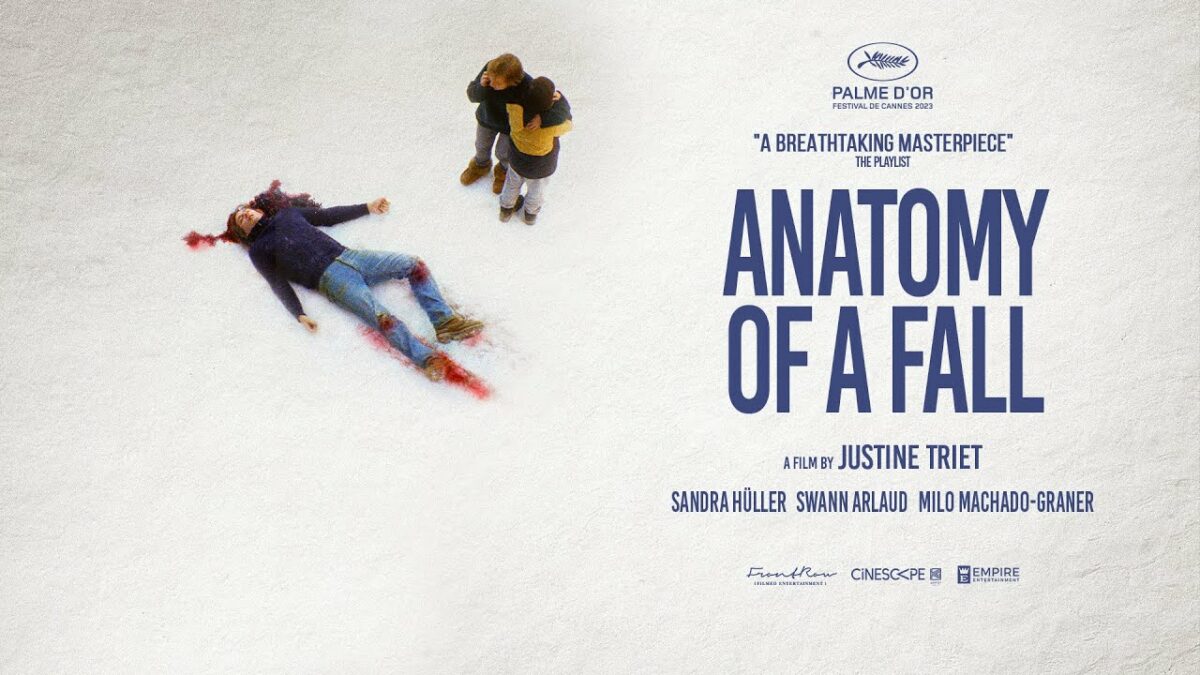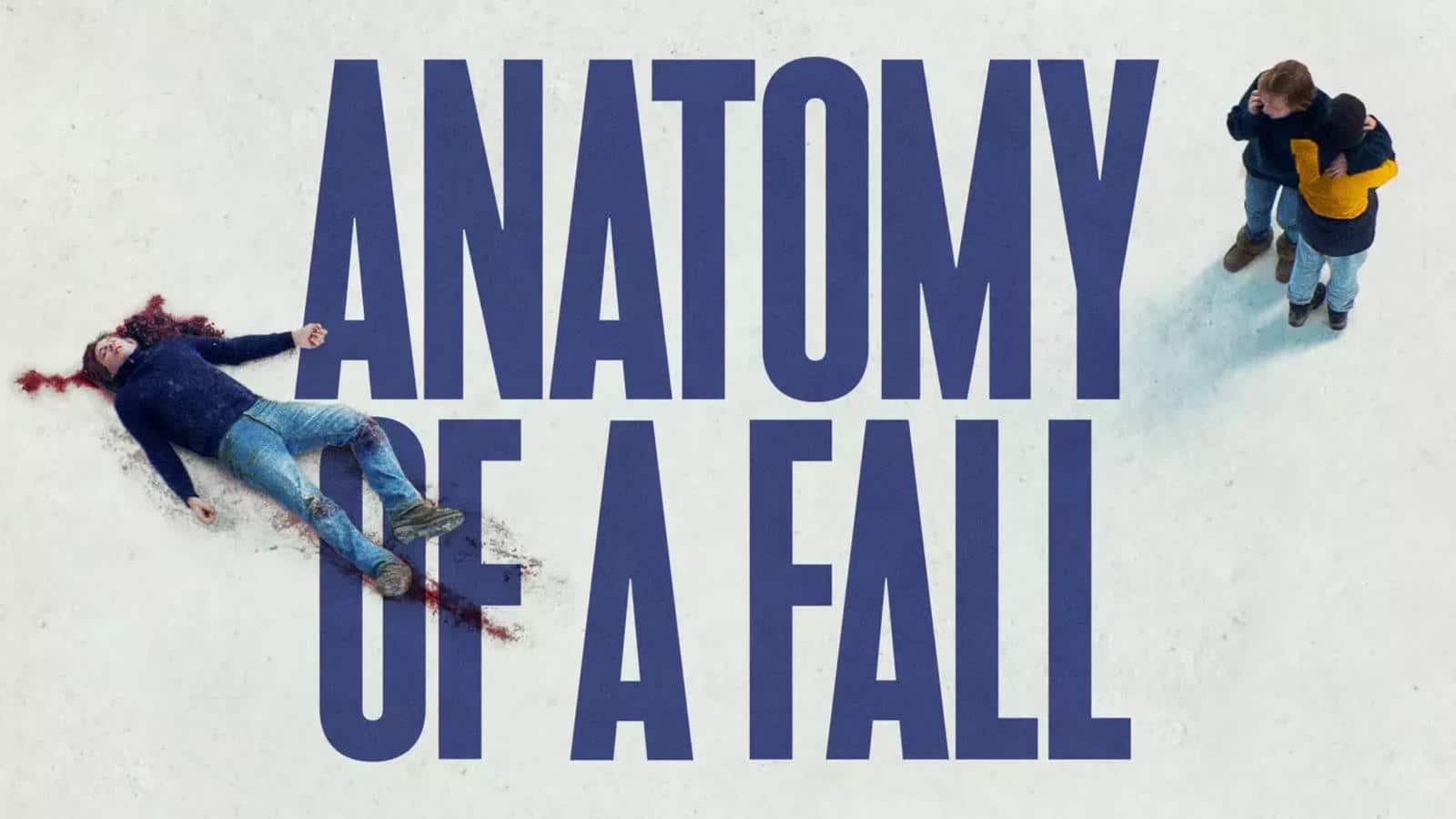
See how the Oscar®-nominated Anatomy of a Fall hits the Save the Cat! story beats.
Written by: Justine Triet and Arthur Harari
Directed by: Justine Triet
Genre: Dudette with a Problem: an “innocent” hero (quotes added for this particular film), a sudden event, a life or death battle
Opening Image: In darkness, women’s voices are talking, laughing; then a jarring visual cut to a ball slowly bouncing down a set of stairs. It feels oddly foreboding, even when the scene turns out to be innocuous, as the ball is being chased by an adorable border collie, Snoop.
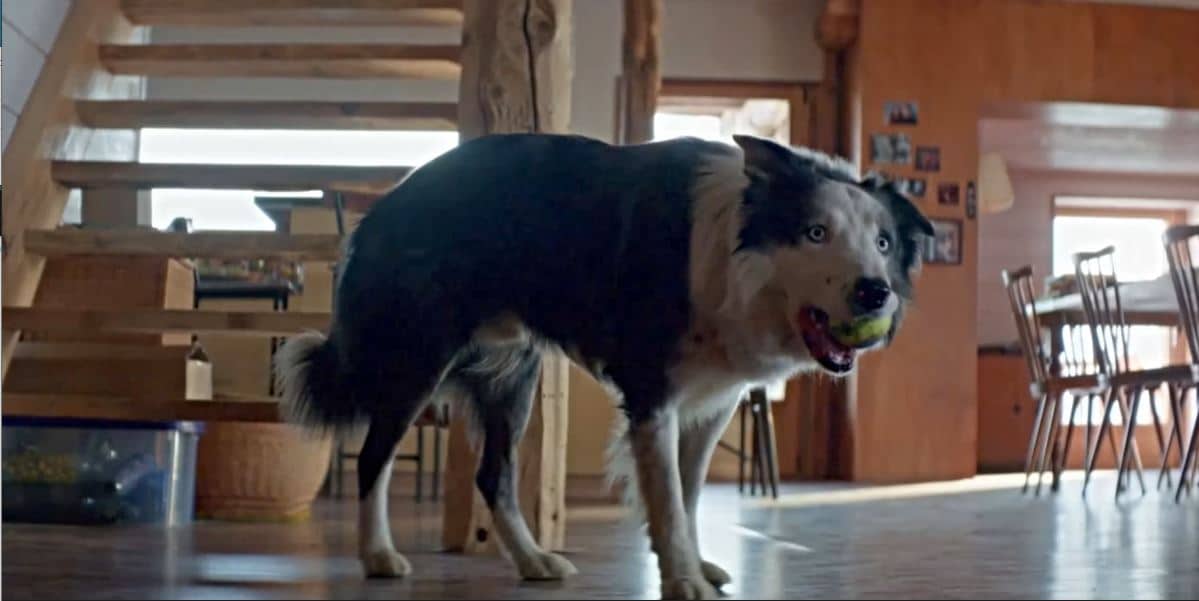
Set-Up: Novelist Sandra Voyter (Sandra Hüller) is being interviewed by a grad student, Zoe (Camille Rutherford), while Sandra’s visually-impaired son, Daniel (Milo Machado-Graner), gives Snoop a bath. Zoe seems slightly puzzled by Sandra’s interest in her, the interviewer, and at times it almost seems like Sandra is flirting. Or is she just happy to be having a conversation with someone—anyone—in this isolated chalet in the French Alps?
Sandra is a thorny, opaque character, difficult to read, and strangely fascinating; she appears to crave freedom and we will soon wonder where that craving may have led her.
As the women speak, music suddenly floods in from an upper floor: an instrumental (steel band) cover of 50 Cent’s “P.I.M.P.”, intrusively loud and accompanied by the racket of power tools. Sandra tries to laugh it off, but the noise feels intentional, like a slap in the face. The women attempt to continue the interview as the volume grows louder, but when the song repeats, they are forced to stop. It’s wildly uncomfortable and much about Sandra’s thesis world remains unspoken as Zoe packs up her things, leaving us with a strong sense of things that need fixing.
Theme Stated: “You say your books always mix truth and fiction and that makes us want to figure out which is which.” Zoe voices the common question about Sandra’s books and, indeed, l’affaire of this entire film: what is the truth about Samuel’s death, and about Samuel and Sandra’s marriage? The question of the death has an objective answer (although Triet slyly refuses to clue us in), but a marriage can be a mystery even to its participants.
Catalyst: Daniel returns from his walk and finds his father Samuel lying on the ground in a pool of blood.
Debate: The Debate section begins with still shots of the interior of the house—rooms, stairs, a set of tools, an open window—as the camera asks us, what happened here? Then a flurry of activity, police and media, questions and confusion and tears. A coroner examines the body and declares that the traumatic brain injury which caused Samuel’s death indicates a collision with a blunt object in the environment or a violent blow to the head. Accidental and/or deliberate?
Daniel sobs in his bed, unable to comprehend what’s happened. Sandra smokes, drinks, tries to comfort her son, but there’s something remote, removed about her attempts. We see photographs of Samuel and Sandra over the years and try to discern from those laughing faces the answers to our questions.
The lawyer Vincent Renzi (Swann Arlaud) appears on the scene and, like most of the relationships in this film, there is something awkward and unspoken—were Vincent and Sandra once lovers? She fills Vincent in on the events before Samuel’s death and we cannot tell if he believes her. Everything about this case sounds so implausible… she was napping in her room with that loud music playing? Why is there no DNA on the shed where Samuel supposedly hit his head? How could he have just fallen when the windowsill was so high? Would he really have committed suicide with Daniel so close by?
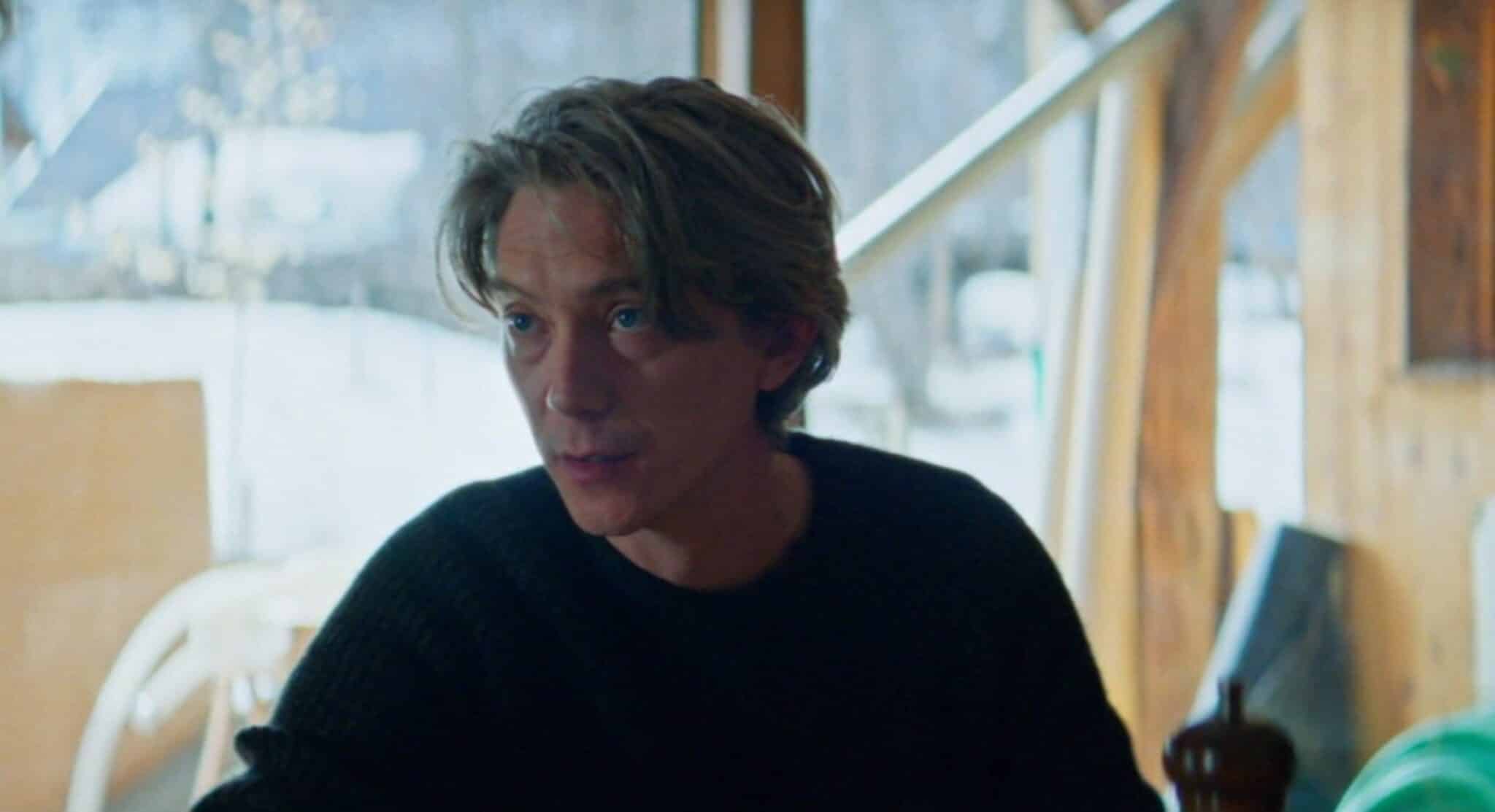
We see Sandra get angry for the first time as she declares that she did not kill Samuel and Vincent says, “That’s not the point.” This is an investigation for mort suspecte, suspicious death, and Sandra is témoin assisté, the “witness and potential suspect,” because she was the only one there.
Break into Two: Sandra is indicted for Samuel’s murder. She has unwittingly forced an Act 2 by not telling anyone that she and Samuel had a huge argument the day before his death, but unbeknownst to her, the court has an audio recording of the fight, a file discovered on a USB key that belonged to Samuel.
B Story: If the A Story is the murder mystery/Sandra and Samuel’s troubled marriage, the B Story relationship is between Sandra and her son, Daniel. There appears to be some coolness and strain from the beginning and the court’s appointment of a monitor, Marge Berger (Jehnny Beth), to live in the house so that Sandra doesn’t influence Daniel’s testimony, adds to their distance. But there is a deep love there, and Daniel’s honesty and strength bolster his mother through this devastating time, causing the lion’s share of her transformation. Sandra is the protagonist, but it is Daniel who becomes the “Hero.”
Fun and Games: Sandra is now in the upside-down, antithesis world of being a suspected murderer on trial. Vincent is angry that Sandra didn’t tell him the truth, but she strenuously protests “that recording is not reality”; it is a snapshot of a moment in the life of a difficult marriage and if it weren’t for Samuel’s death, it would remain an argument between two people, not known to anyone else. She maintains this stance even when L’avocat general (a nameless prosecuting attorney brutally played by Antoine Reinartz) badgers and demeans her, and she is forced to testify in French, not her native language.
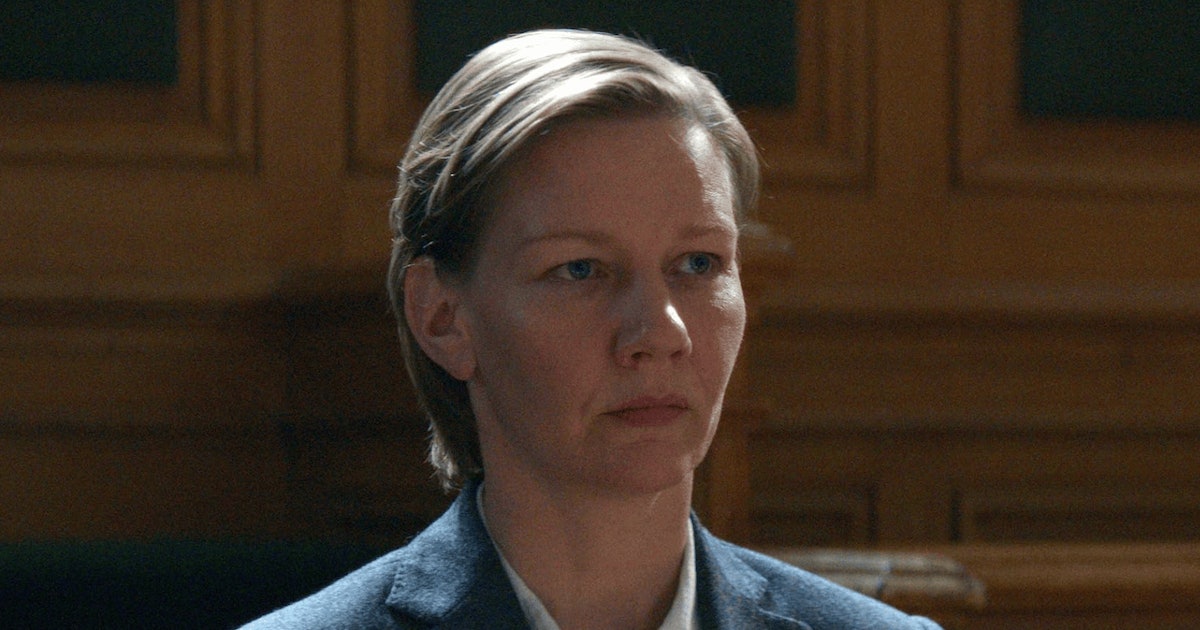
In the tension-filled courtroom, we find out many things that cause us to question everything we think we know: Samuel struggled with tremendous guilt because he felt responsible for the accident that caused Daniel’s visual impairment; Sandra is bisexual and has had affairs; the couple was having serious money troubles; Samuel wanted to be a writer but was unsuccessful, unlike his very successful wife.
We are certain one moment that Sandra is innocent, only to question her innocence in the next. The blood spatter experts vehemently disagree with each other: Expert Balard insists that the blood splatter could only have come from a violent blow and a rage-filled push over the guardrail and Expert Bogaert says the opposite, that Samuel hit his head on the shed after falling or jumping from the third floor. The back and forth is dizzying and captivating.
Midpoint: Sandra testifies that she thinks Samuel had attempted suicide six months prior. In a false defeat, we can see that while this information may possibly save Sandra, it crushes Daniel.
Bad Guys Close In: As Daniel withdraws from his mother and she tries to convince him she’s not the monster they’re making her out to be, the disintegration of Sandra and Samuel’s marriage is laid out in warped detail. Samuel’s therapist testifies that he had been on antidepressants since Daniel’s accident, trying to deal with the shame and guilt because Sandra was “castrating” him. Sandra bites back, in English now, as she can’t express herself in French any longer: “Sometimes a couple is kind of a chaos and everybody is lost.”
Samuel and Sandra’s “lostness” is revealed and interpreted when the chaotic recording of their argument is played in court. In a clever bit of flashback filmmaking, Triet takes us visually to the fight and it’s the first time that we actually see Samuel, save for the earlier photographs. It’s painful to watch as the couple’s inner bad guys do battle and just as the argument boils over into physical violence, Triet takes us back to court, reminding us that listening is not seeing, but even seeing has its limits, as metaphorically underscored by Daniel’s impaired vision.
All Is Lost: After the damning recording and the battering by the prosecutor, Daniel tells his mother that he wants her to leave the house for the weekend; he wants to be alone before his testimony.
Dark Night of the Soul: As Vincent drives her away from the house, Sandra breaks down in sobs. She’s been strong to the point of mulishness throughout this entire ordeal, but the seeming loss of her son’s love and trust is too much for her. Back at home, Daniel sobs because he just doesn’t know if his mother is innocent or guilty. It appears that she’s been convicted in the minds of those in the courtroom and the media is relishing the seeming connection between Sandra’s novels and Samuel’s death, but for the two at the center of this drama, there is a whiff of death as A and B Stories cross.
Break into Three: Marge tells Daniel that even though he’s been given two choices and he doesn’t know what the truth is, he needs to decide what he will believe.
Finale: Daniel goes back to court on Monday and storms the castle, saying it is more logical to him that his father committed suicide than that his mother killed him.
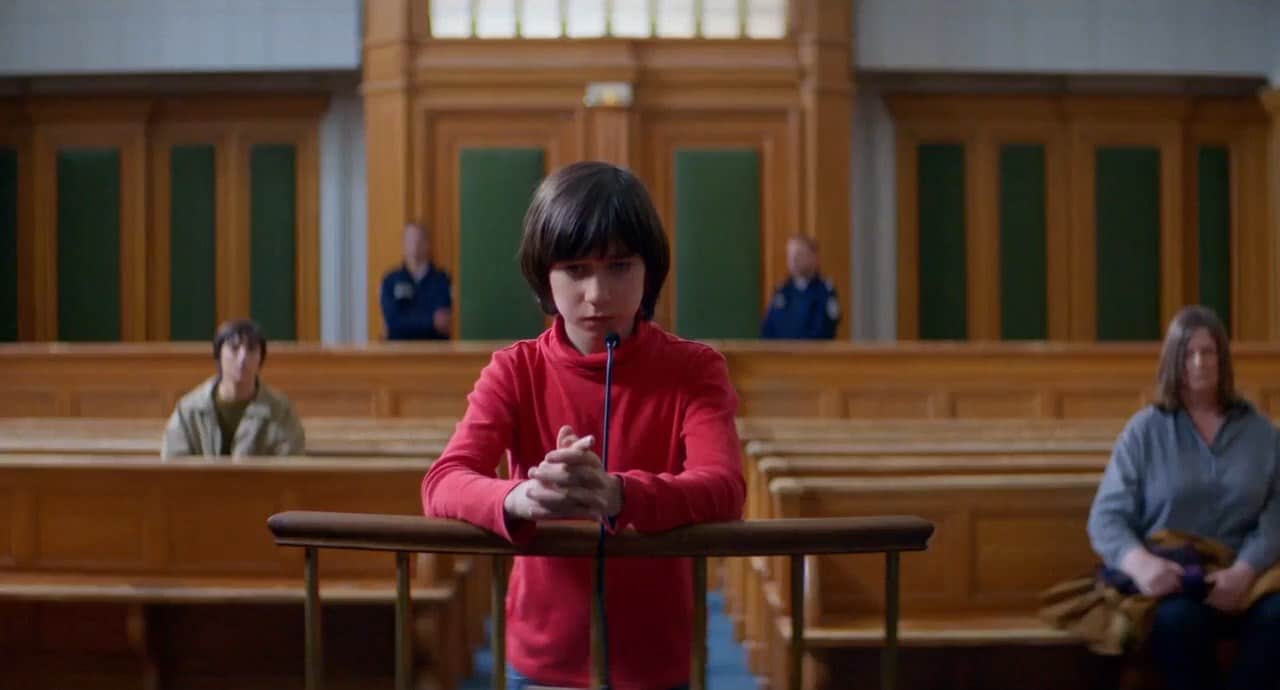
In a high tower surprise, Daniel shares a memory from a time that Snoop had gotten sick. As they drove home from the vet, Samuel told Daniel that he should prepare himself for when Snoop would die. When Daniel protested, Samuel said that eventually Snoop would tire of taking care of everyone and he would choose to go away. Daniel tells the court that he has realized that his father was talking about himself.
This assertion lands like a bomb in the courtroom and the prosecutor protests vigorously that the story is subjective and does not qualify as proof, but it’s obvious to everyone that Daniel has decided what he will believe. He has spoken his truth and… possibly… the truth.
Sandra is acquitted and both she and Daniel shed tears of joy. But at a celebratory dinner with Vincent and his legal team, Sandra seems conflicted and unhappy. She says it’s because the verdict was bizarrely anticlimactic, but we feel uneasy and just a little dissatisfied; it’s still hard to “see” the truth and we don’t sense her synthesis.
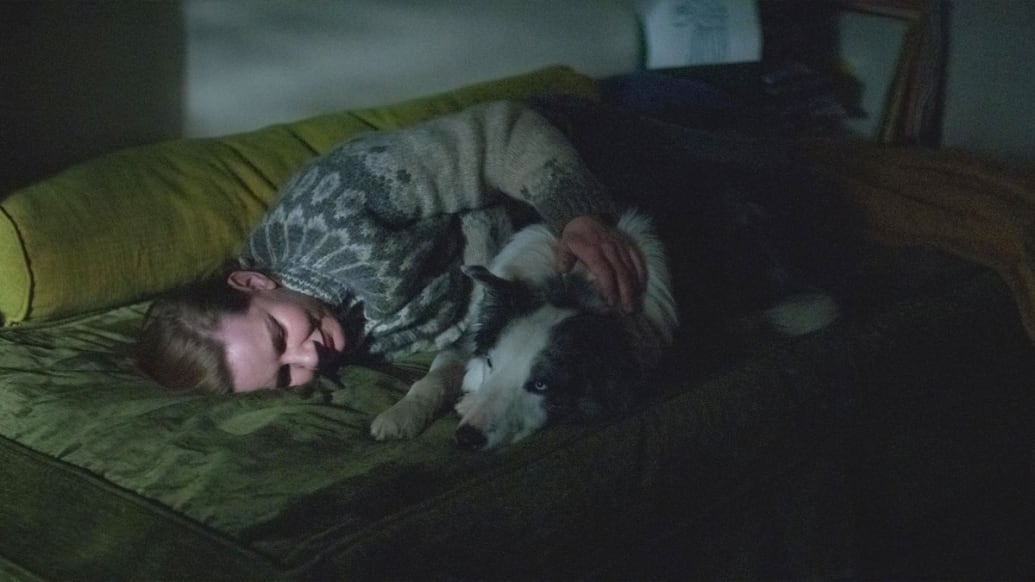
Final Image: The film ends with a mirror image of how it began as Snoop appears and snuggles up to Sandra on the bed. She holds him, her savior, and quite possibly the only one who knows what really happened. Because we certainly don’t.


